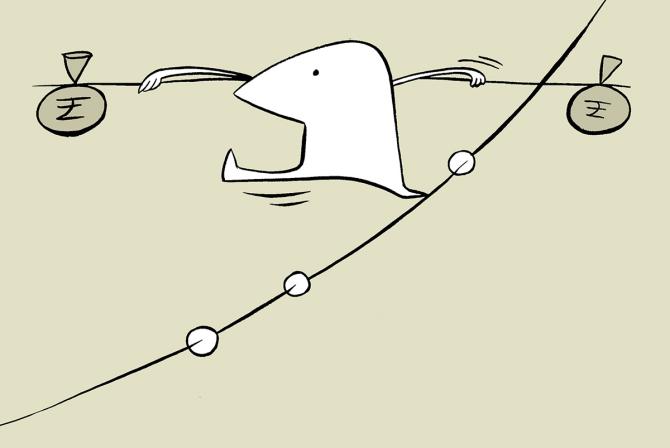Do not shop around for loans immediately after getting a secured credit card.
Such loan enquiries can also pull down credit score, as they are treated as a sign of credit-hungry behaviour.

Personal loans given by fintech players in the under Rs 1 lakh category have grown at a compounded annual rate of 75 per cent between financial year (FY) 2017-2018 and FY 2022-2023.
After this rapid growth, there are signs of stress in fintechs' loan portfolios, especially in the under Rs 50,000 ticket size, according to a white paper released by Experian in collaboration with the Digital Lenders' Association of India (DLAI).
Reckless use of an unsecured loan (personal loan or credit card dues) can lead to a default, which impacts the borrower's credit score negatively.
This can lead to a situation where it becomes difficult or impossible for the person to avail further credit. Even if they get it, the interest rate is high.
What is a bad credit score?
Credit bureaus create credit scores based on an individual's repayment record and borrowing pattern.
A low credit score, typically below 700 (out of a maximum of 900), can lead to the rejection of loan applications.
Credit score falls when one defaults, delays repayment, or applies for multiple loans.
"Improving a poor credit score requires time and discipline," says Raj Khosla, founder and managing director, MyMoneymantra.com.
Get a secured credit card
To build a healthy credit score, one needs to borrow and repay on time, and thereby establish a sound track record.
But if you are in a Catch-22 situation where you do not have a loan because your credit score is poor, but need one to improve it, a secured credit card can help.
"Those who are unable to get a credit card or a loan due to absent or poor credit history may opt for a secured credit card to improve their credit score," says Radhika Binani, chief product officer, Paisabazaar.
A secured credit card is backed by a fixed deposit. The credit card issuing entity marks a lien on the FD and issues a credit card against it.
The lender gives little importance to the person's credit history or income. The card limit is set at around 90 per cent of the FD's value.
At the end of each month, the credit card user gets the bill. If the entire outstanding is paid regularly on time, the credit score starts to improve.
If the credit card user fails to repay the outstanding and the amount reaches the FD's realisable value, the card issuing bank recovers it by taking over the FD.
Limit credit utilisation
While using the secured credit card, avoid using the credit limit to the hilt.
"High credit utilisation can signal to lenders that you are over-reliant on credit. This can negatively impact your credit score.
"It is advisable to keep your utilisation low - ideally below 30 per cent of your available credit limit.
"A lower utilisation rate is seen as indicative of good financial management, which positively affects your credit score," says Khosla.
Avoid being credit-hungry
Do not shop around for loans immediately after getting a secured credit card. Such loan enquiries can also pull down credit score, as they are treated as a sign of credit-hungry behaviour.
"Avoid showing signs of over-dependence on credit by making multiple applications for loans or credit cards within a short period," says Binani.
Adds Khosla: "Every time you apply for credit, lenders conduct a 'hard inquiry' to check your creditworthiness.
"Each such inquiry lowers your credit score slightly. Frequent applications can compound this effect."
Once you have built a credit score, you may access fresh loans.
Review credit score periodically
Regular review of credit report not only helps detect inaccuracies but can help you take prompt corrective actions if the score is falling.
"Obtain a copy of your credit report from the bureaus to detect any inaccuracies or unauthorised activities and address them promptly to safeguard creditworthiness," says Anil Rego, founder and CEO, Right Horizons.
The credit score is often impacted by an error or even fraudulent activity.
"Study your credit report closely to understand the reason behind the poor score," says Binani.
Boost credit history: Convert settled account to closed
- Loans become 'written off' after 90 days of non-payment, significantly harming your credit score
- Settling a loan for less than the amount owed (paying, say, Rs 70 instead of the Rs 100 owed) results in the account being marked as 'settled' in your credit report
- Having a 'settled' account on your credit report can lead many lenders to reject your loan application
- If you have a settled account, pay the remaining balance and have it marked as "closed" to improve your credit history
Disclaimer: This article is meant for information purposes only. This article and information do not constitute a distribution, an endorsement, an investment advice, an offer to buy or sell or the solicitation of an offer to buy or sell any securities/schemes or any other financial products/investment products mentioned in this article to influence the opinion or behaviour of the investors/recipients.
Any use of the information/any investment and investment related decisions of the investors/recipients are at their sole discretion and risk. Any advice herein is made on a general basis and does not take into account the specific investment objectives of the specific person or group of persons. Opinions expressed herein are subject to change without notice.
Feature Presentation: Ashish Narsale/Rediff.com












 © 2025
© 2025